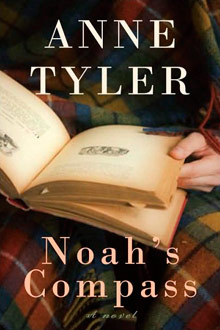Rude Awakening
A Quirky Novel About a Lonely Man, Interrupted

Photo: Marko Metzinger/Studio D
Noah's Compass
By Anne Tyler
288 pages; Knopf
Which is more painful: to struggle to remember what you've forgotten, or to repress what you don't want to recall? Once again wrapping big questions in a modest package—muted, middle-class, midsize Baltimore—Anne Tyler's Noah's Compass , her 18th novel, is a characteristically offbeat delight. Liam Pennywell has long ago given up on his family, his intellectual ambitions, the ability to feel, any need to connect. He's 61, recently phased out of his job teaching fifth grade at a lower-tier private school, and incapable even of ordering a sofa for his impersonal new apartment in a sad suburban complex—"a 'down-and-outers' kind of place," his sister calls it—because a comfortable piece of furniture might allow for proximity between human beings. But when an intruder attacks him on his first night there and he wakes up in the hospital with no memory of having been attacked, life begins to come back to him, in the form of memories he has preferred adamantly—cruelly, even—to trash. Suddenly, the teacher must learn a lesson of his own.



